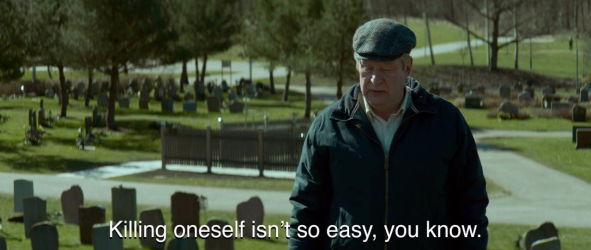While we have seen some good movies this year and a fair number of okay movies, there haven’t been many at all that made us sit up and say, “Wow, this is easily one of the year’s best!” You know, if you go to the movies a lot, you get a sense for film that’s going to stand out, no matter whether it’s January or (as in this case) October. This Swedish slice-of-life drama/black-comedy is one of those films.

Oscar-worthy.
Ove is a grumpy, old man who stalks around his little community terrorizing anyone who dares to break the rules. He’s an old school blue collar guy, possibly even illiterate—I’m trying to remember if he actually reads anything in the movie—but the guy you go to if you need some fixed. Or, really, if you just need something done. Curiously, despite his crankiness, the people of his community have a kind of mixed reaction to him. The rule breakers hate him, sure, but everyone else sort of treats him either mildly or with gentle attempts at friendship (summarily rejected).
As it turns out, Ove is a widow. A fairly recent widow. His wife was delightful, it seems, and even old Ove wasn’t such a bad guy, as pissed off as he is now. But Ove, as we’ve noted here, is a doer, and, on the surface, this movie is about his multiple suicide attempts.
I know: Swedish, right?

Ove’s new bosses. Pencil-necked geeks are the same the world over.
This is hilarious. I mean, it’s poignant for the fact that he misses his wife, and so day after day, he visits her grave and promises they’ll be together soon. But it’s hilarious because he just can’t pull it off. Like the old Parker poem:
Razors pain you Rivers are damp Acids stain you Drugs cause cramps Gas smells awful Nooses give Guns aren't lawful You might as well live
The world, with its shoddy construction and constant need of attendance conspires against Ove to rob him of his reunion with his wife. But the attempts are cues for flashback, where we see Ove’s often tragic and occasionally glorious (Swedish, amirite?) life with its terrible, tragic losses and his determination to make things better, even if that means grabbing the hammer and nails and fixing it himself.

Explaining to his wife why he’s late.
His arch-nemeses in life are the white shirts, who appear at various points in his life demanding things they have no right to, but always getting their way. Of course, I would look at this and say “government bureaucrats and their associated private sector cronies” but the Swedish interpretation may be different. It’s not just that, of course: The white shirt represents all people who do nothing, who contribute nothing, whose sole purpose is to tell others what to do.
Ove doesn’t care for them.
Eastwood’s Sully doesn’t either.
Interesting theme. Ove feels more like a WWII kind of guy though he’s squarely in the post-War generation (Boomers, here in America) but his rustic background and outstanding ethical sense puts him above the crowd. And that’s really where the seemingly petty tyrannies come from: Here in his little community, he has created with the agreement of the other tenants, a kind of well-ordered paradise where people can live in harmony—as long as they don’t drive jävla Volvos—and even if they do drive Volvos, everyone can live together without killing each other if they live by the rules.
Which no one is much interested in these days.
The bit about Volvos is from the film. I wish the Old Man could’ve seen it because Ove drives Saabs, like a real man. (The Old Man loved a Saab.) He gets into a lifelong feud with an otherwise good neighbor because that guy drives Volvos. Despite his pecadillos, Ove is above-all ethical. The guy is so conscientious that when he contemplates blowing his brains out, he first lays out plastic everywhere so there won’t be a big mess to clean up.
His concern for fairness and what’s right is so severe that he rides a train for three weeks to give money back to a woman who buys a train ticket for him. She’s so taken with him, that she asks for a date rather than repayment. And this becomes Mrs. Ove. It’s a beautiful, beautiful love story. Imagine the opening scene of Up played out for about two hours, and you wouldn’t be far off.

Also, he rides the train for three weeks ’cause she’s really cute.
It’s just a great film; a simple story told well. It will be entered in this year’s foreign language Oscar category and while I hope it wins, it lacks the sort of social harmonic that Oscar seems to demand most years. But that doesn’t mean you have to miss it. And you shouldn’t.

I saw someone on the train reading this book. Sounds like something I would like.
This was a wonderful film. My step-daughter also noticed the “UP” resemblance.